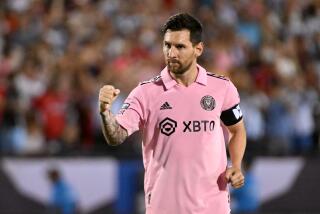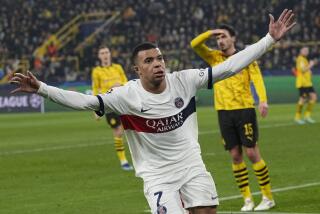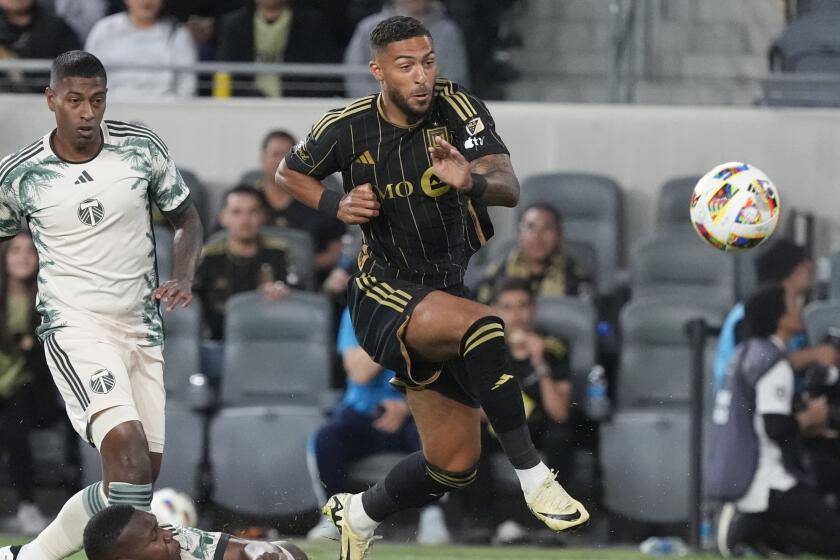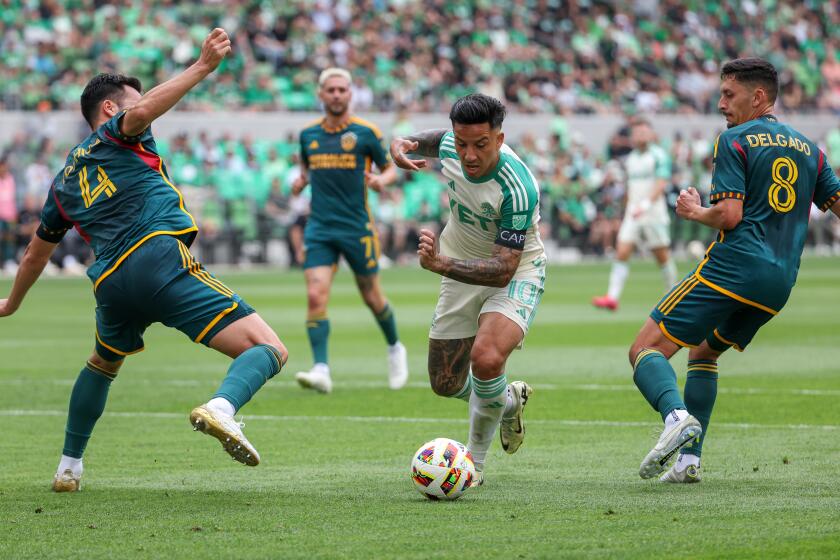Denmark Stops for European Final : Soccer: All eyes are on the upstart national team, which plays Germany in the championship game.
On Monday night in Copenhagen’s Town Hall Square, a crush of humanity spilled onto the streets of the crowded Danish capital.
Young and old alike filled the Stroget mall, whose ancient buildings house the country’s trendy boutiques. The masses were strung from the center to Christianborg Castle, home of Denmark’s parliament and Supreme Court, more than a block away.
“The country is going mad,” said Ejvind Fritzboter, an editor in the sports department of the country’s largest daily, Ekstra Bladet.
Denmark, a country of 5.1 million, has reason to go a little batty today. The Danes have accomplished a minor sports miracle.
Invited to soccer’s European Championships only after Yugoslavia was banned, Denmark has reached tonight’s final in Gothenburg, Sweden, against defending World Cup champion Germany.
More than 50,000 jammed Copenhagen’s center after Monday’s 5-4 semifinal victory over the Netherlands. Fritzboter said the last time the nation celebrated that way was May 5, 1945, when Allied forces liberated Denmark from neighboring Nazi Germany.
Win, lose or draw in tonight’s final, the Danes already have made an indelible mark on the sport and their country, if not all Europe.
This tournament, held in Sweden, was marred by rioting fans outside the stadiums for much of the first week. The media focused on English, German and Swedish hooligans, whose street fighting gave the tournament unwanted publicity.
After upsetting the powerful Dutch in a shootout that soccer fans will not soon forget, Denmark has put the emphasis of European football back on the field.
“(The semifinal) left the most hardened observers of soccer breathless,” said Jim Trecker, a U.S. World Cup official, watching the championships in Sweden. “The Danes played with emotion and a purpose.”
Whether they can match that performance tonight against Germany is doubtful. But then, they were not even supposed to be here.
“We’ll show (the Germans) respect, but we don’t fear them,” Danish goalie Peter Schmeichel said Thursday.
After defeating Sweden, 3-2, to reach the final, German midfielder Thomas Hassler said he was looking forward to facing the Netherlands, which had routed his team, 3-1, in group play.
Lars Berendt, a Danish soccer spokesman, said before the semifinals that the Dutch delegation had called to ask if it could buy Denmark’s ticket allotment for the final. Shortly afterward, the German federation called, also wanting the tickets.
That all changed when Schmeichel blocked a shot by Marco van Basten, the Netherlands’ $6-million star, in a shootout, giving the Danes the victory.
More surprising than van Basten’s failing was the play of three Danes, who do not compete full-time in professional soccer, but who were successful in their penalty kicks.
Despite the long odds against Germany, the Danes are preparing for the final with a flair. Copenhagen officials have erected wide-screen television sets at Town Hall Square, and plans call for music and dancing in the streets. Danish fans, known as rolegans , have been some of Europe’s best behaved, so no one is concerned about violence.
Business and holiday plans have been postponed today throughout the the kingdom. Even the government is on hold. Prince Henrik, husband of Queen Margrethe II, and their son, Crown Prince Frederik, a Harvard student, will attend tonight’s game with German Chancellor Helmut Kohl.
Proud Danes reminisce about the 1986 World Cup in Mexico, when Denmark advanced to the quarterfinals before losing to Spain, 5-1. Players from ’86 are long gone, replaced by the current team, which has gone through the junior ranks with Coach Richard Moeller Nielsen.
Despite two years of criticism in the Danish press, Moeller Nielsen has persevered. The team has two would-be stars--Brian Laudrup and Flemming Povlsen--but mostly gets by on teamwork.
The country’s soccer writers were upset because Moeller Nielsen left Denmark’s two best players off the national team--Michael Laudrup, Brian’s brother; and Jan Molby, who plays for Liverpool in the English league.
Moeller Nielsen said he did not want to rearrange the team’s style to accommodate Molby, but has refused to discuss his dispute with Laudrup.
“In 1990, Richard had to build a totally new team,” Berendt said.
The team did not immediately respond, but when it defeated Yugoslavia in Belgrade to place second in European Championships qualifying by one point last year, something changed.
Facing England, France and Sweden in group play, Denmark, which finished last in the 1988 European Championships, played well. The Danes started quickly by upsetting France, 2-1, and then tying England. Indeed, something had changed.
As if the odds are not already great enough, Denmark goes into the final injury-plagued. Star defender Henrik Andersen shattered a kneecap after colliding with a Dutch player Monday, and Bent Christensen, injured against France, needs knee surgery. Seven others have some sort of muscle strains, but are expected to play tonight.
Some suggest that the Danes came to the tournament out of shape. After failing to qualify for the championships, many of the players began summer holidays last month. When they got the reprieve, they had to regroup quickly in mid-June.
“It has been very hard for them,” said Fritzboter, the editor in Copenhagen. “They weren’t mentally prepared for the European championships. A lot of players weren’t fit for championships.”
Under the circumstances, Moeller Nielson will not predict a victory.
“I am not saying that we will win, but we will try,” he said.
Free-lance writer Grahame L. Jones in Gothenburg, Sweden, contributed to this story.






